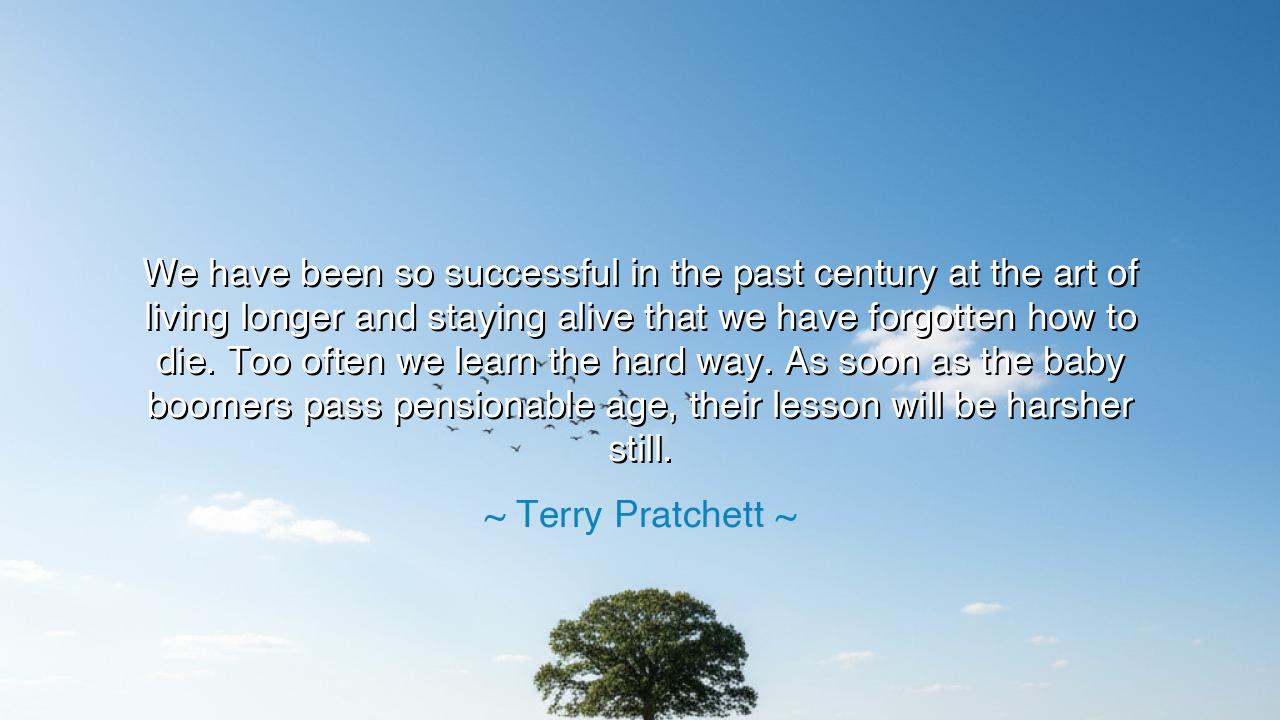
We have been so successful in the past century at the art of
We have been so successful in the past century at the art of living longer and staying alive that we have forgotten how to die. Too often we learn the hard way. As soon as the baby boomers pass pensionable age, their lesson will be harsher still.






“We have been so successful in the past century at the art of living longer and staying alive that we have forgotten how to die. Too often we learn the hard way. As soon as the baby boomers pass pensionable age, their lesson will be harsher still.” — Terry Pratchett
Thus spoke Terry Pratchett, the sage of satire and sorrow, who clothed profound truths in garments of irony. In these words, he reminds us of one of humanity’s oldest paradoxes: that in mastering the art of survival, we have lost the wisdom of acceptance. He does not speak in bitterness but in lamentation — for a world that fears the inevitable has forgotten how to live rightly. To “forget how to die” is to lose our harmony with nature, to sever the balance between the rising of the sun and its setting. For death, far from being our enemy, is the quiet teacher that gives meaning to our time beneath the sky.
In this age of machines and medicine, of pills that postpone and surgeries that extend, mankind has conquered disease and delayed decay. We are victorious in the realm of longevity — but defeated in the realm of peace. The ancients once viewed death not as an intruder but as a companion on life’s journey, walking just a few paces behind. The modern soul, however, banishes him from sight, builds hospitals to hide him, and names his presence “failure.” We live longer, yes, but we die fearfully, clinging to days that no longer hold meaning. Pratchett, who faced his own mortal illness with wit and grace, saw this irony firsthand. He did not despise life; he simply mourned the loss of our ability to depart from it with dignity.
The great philosopher Socrates met death as one meets a friend long expected. When offered the chance to escape his execution, he refused, saying that the soul’s journey could not be halted by fear. In the end, he drank the poison calmly, speaking of the afterlife as one speaks of a voyage home. This, perhaps, is what Pratchett meant when he said we have forgotten how to die — that the modern age, obsessed with staying alive, has lost the courage to face the unknown with serenity. To know how to die is not to court death, but to honor life enough to let it go when its season ends.
And yet, the loss is not only spiritual. Pratchett warns that the coming generations — the baby boomers and their heirs — will face a harsher reckoning. As people live longer than the world was built to sustain, the burdens of age will grow heavier: dwindling pensions, strained families, crowded hospitals, and the quiet despair of those who linger without purpose. We have built a civilization skilled at prolonging life, but not at giving it meaning in its twilight. The lesson, he says, will be “harsher still,” for nature always reclaims what we deny her. To live wisely is not to flee mortality, but to prepare the heart for its gentle arrival.
Yet there is no cynicism here, only the deep compassion of one who faced his own end with open eyes. Terry Pratchett, afflicted by Alzheimer’s, became an advocate for the right to die with dignity, not from weariness of life but from respect for its boundaries. His was a modern echo of the Stoics, who taught that freedom lies in choosing one’s own peace. His words remind us that to forget death is to forget how to value each day. When we live as though time is endless, we waste it; when we remember that it is finite, we make it sacred.
The ancients spoke often of memento mori — “remember you must die.” It was not a curse but a blessing, a reminder to live each moment with purpose, humility, and tenderness. The one who walks with death at his shoulder learns gratitude. He learns to love more fiercely, to forgive more quickly, to leave no word of kindness unsaid. This, then, is the true art of dying — not to seek it, but to meet it prepared, knowing that the tapestry of one’s days has been well woven.
Practical counsel for the seeker:
-
Do not turn your face from the thought of death; let it be your teacher, not your terror.
-
Live each day as though it were both your first and last — curious, grateful, awake.
-
Honor the elderly, not for their years alone but for the courage it takes to face time’s truth.
-
Seek meaning, not merely longevity; a short life well-lived is greater than a long one wasted in fear.
-
And when your hour comes, strive to meet it as Socrates did — calm, complete, and free.
For as Terry Pratchett reminds us, the goal of life is not simply to stay alive, but to live fully and depart wisely. In learning again the art of dying, we rediscover the art of living. For only those who have made peace with the end can truly rejoice in the beginning — and walk their days upon this earth as both mortal and eternal.






AAdministratorAdministrator
Welcome, honored guests. Please leave a comment, we will respond soon